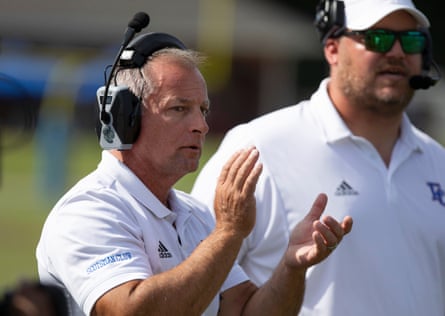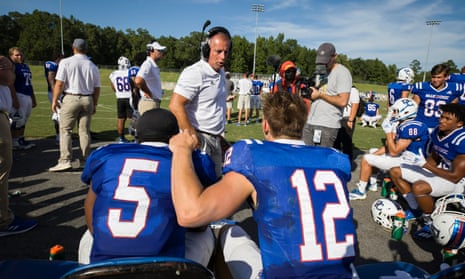Two weeks ago the Presbyterian College football team was on the road against Campbell University when the game reached a critical juncture. Already down 14-zip with less than five minutes left in the first quarter, the Blue Hose had just taken a sack on third-and-long that pinned them on their own four-yard line. Making matters worse, the play clock expired on quarterback Ren Hefley and backed up Presbyterian even farther – to the two-yard line.
Most any other football coach in America wouldn’t have to think twice about what to do next: kick the ball away. But Kevin Kelley is different, he made his name by boldly keeping his offense on the field on fourth down instead of punting or trying for field goals. This time, his decision to actually punt was an agonizing one that felt like a psychic defeat. “They were just manhandling us,” says the 52-year-old coach, who was still smarting about his call when the Guardian caught up with him this week. “The chances of us converting on fourth down were not looking good.”
And even though there’s no doubt Kelley did the right thing, it’s nonetheless an odd concession from a man famed for going for it. Add to that his humility and indefatigable optimism and, well, you might take him for a real-life Ted Lasso – complete with light-blue wardrobe now. “Do not say I compared myself to Ted Lasso,” he says, a big fan of the series. “You brought it up. But it’s actually a pretty decent parallel. He goes through his downtimes, and there’s a lot of work convincing people to buy into what you’re doing. But optimism is definitely there because he believes in what he does, and I believe in the choices I’m making for my team.”
In a game that thinks inside the box, where conservatism rules and coaches are conditioned to play it safe, Kelley’s approach is nothing short of heresy, an affront to the football gods. That it stems from the research of David Romer, an economics professor who has made a robust mathematical case for NFL teams to go for it on fourth-and-four or fewer rather than playing it safe and kicking the ball away, only further riles a community that is notably wary of analytics.
But, by God, Kelley has proven his method works. While the coach at Pulaski Academy, a 1,200-student private school in Little Rock, Arkansas, Kelley won nine state championships while compiling more than 200 victories in 18 years. All the while he considered testing his go-for-broke philosophy at the next level. But when Kelley interviewed with college athletic directors, it seemed job offers were contingent on him turning into a more recognizable mad strategist like Mike Leach, the Mississippi State guru who popularized the “Air Raid” offense; or Art Briles, the former Baylor head man who sped up the spread formation.
In essence, they wanted Kelley to be a coach who innovates without bucking tradition. “People can say what they want about the game change when you move up to college,” Kelley says. “And I’m not saying there’s not some changes. I’m saying that when you’ve been successful doing something, and you move up, it doesn’t make sense to me to quit doing what made you successful.”

Presbyterian athletics director Rob Acunto saw it the same way; in May he hired Kelley to take over a 4-3 team that saw its 2020 season Covid-postponed until last spring. What’s more, Presbyterian does not offer athletic scholarships – which meant Kelley not only didn’t get to recruit most of the players on his roster; he didn’t truly begin working with them until a couple months or so ago. “We didn’t have ’em all in for summer; they don’t do that here because they’re non-scholarship,” the coach explains. “I got them on 7 August. Talk about a learning curve. We’re still learning like crazy. And that’s the hard part for me. The time constraints. No spring ball. Brand new offense. Brand new defense. All that kind of stuff.”
Not surprisingly, the short runway has made for a rather turbulent start to the 2021 season, with players adapting on the fly and the Kelley method taking its share of shocks in the process. The Blue Hose trounced their first two opponents by a combined 106 points; Hefley, a dual-threat QB who transferred from Michigan, tossed an FCS record 10 touchdowns in his maiden start. That set high hopes for the game against Campbell. But, alas, Presbyterian wound up crashing 72-0. (“We were playing a scholarship team,” Kelley reasons.) Last Saturday against Dayton, the Blue Hose acquitted themselves better, jumping out to a 23-0 lead before allowing 49 unanswered points and falling 63-43 at the final gun. They punted in that game too, for minus-four yards. It’s enough to leave some football aficionados struggling to stifle their snickers.
But Kelley knows his method isn’t for everyone. Opinions tend to pool into two camps. On one side there are the folks under 40, the kids who grew up on flag football and Madden video games. On the other are their parents and grandparents who believe that it’s called football for a reason. Kelley used to run into the latter types often at coaching clinics and recalled one instance where they even shunned him at a lunch, leaving him to dine on his free pizza alone. “That was back in the early 2000s and nobody was doing it that way,” Kelley says. “I was 33, and even for a high school coach they still view you as a young guy. And there weren’t a lot of younger guys who were head coaches. Now when I go to coaches’ clinics the younger guys just flock to me.” Even some old schoolers had to come around after Bill Belichick called him “probably the top high school coach in the country.”
Still: it’s not as if Kelley doesn’t understand the wariness. After all, football coaches are such prominent figures whose every decision is parsed under a microscope. And the pressure to get it right isn’t just the difference between wins and losses. It’s the difference between being employed and on the street. Given those immense stakes, it’s no wonder football coaches default to playing it safe compared to their counterparts in other sports. “Baseball’s easier to move into analytics,” Kelley says. “I can tell you Pete Carroll is the head coach of the Seahawks. Everybody knows what he looks like. But who’s the manager of the Seattle Mariners? No offense to the guy” – it’s former big league catcher Scott Servais, by the way – “but if you’re not seen or known, it’s easier to make nontraditional decisions.”
Kelley doesn’t have the benefit of relative anonymity anymore. He expects to be judged harshly as he finds his footing on this new turf. He expects to run into bumps and divots. But they’re nothing Kelley couldn’t overcome again while evolving his method from one man’s flight of fancy to a style of play well worth copycatting. “When the Wright brothers flew their planes, the first one didn’t get off the ground or go very far,” Kelley says. “These kinds of big changes just take time. The difference between me and them is I want it to work immediately.”
And if it should work out spectacularly? Well, don’t expect Kelley to go running into the arms of a bitter Premier League team-owning divorcée looking to get back at her husband. “I hope I’m not a Ted Lasso that ends up in another sport,” Kelley says with a laugh. “I’ve coached other sports, and I love coaching football.” He loves the locker room, too. Smells like potential.

Comments (…)
Sign in or create your Guardian account to join the discussion